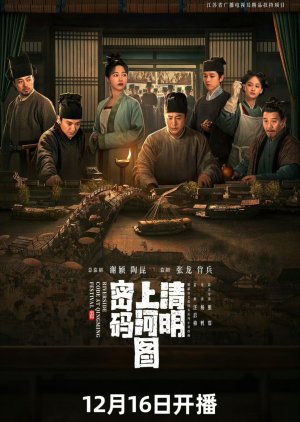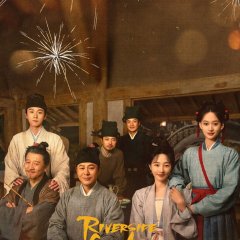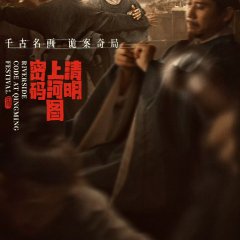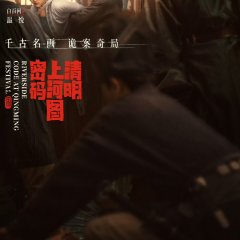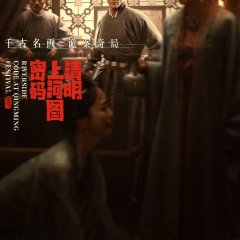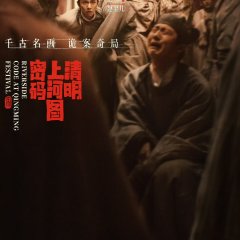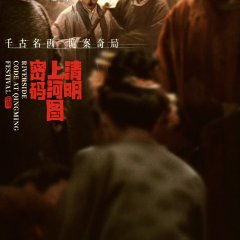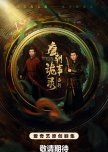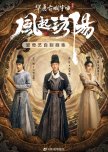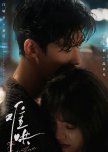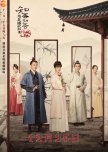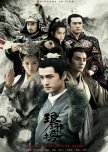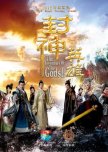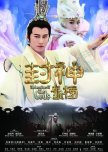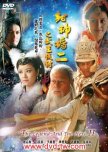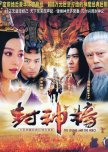During the Northern Song Dynasty, a bustling corner of Qu'er Alley in Bianliang City was home to the Zhao family, five individuals with wildly different personalities. Zhao Bu You, a low-ranking clerk, sought a simple life, while his wife, Wen Yue, aimed to buy land and secure their future. Despite frequent arguments, the family remained close. Their lives took a dramatic turn when they were drawn into the sensational Mei Ship case. (Source: Youku.tv) ~~ Adapted from the novel "Qing Ming Shang He Tu Mi Ma" (清明上河图密码) by Ye Wen Biao (冶文彪). Edit Translation
- English
- Русский
- Français
- Português (Brasil)
- Native Title: 清明上河图密码
- Also Known As: Riverside Scene at Qingming Festival , Qing Ming Shang He Tu Mi Ma , 清明上河圖密碼
- Director: Yang Fan
- Genres: Thriller, Historical, Mystery
Where to Watch Riverside Code at Qingming Festival
Cast & Credits
- Zhang Song WenZhao Bu YouMain Role
- Bai Bai HeWen Yue / Su YueMain Role
- Zhou Yi WeiGu Zhen [Kaifeng Court's zuojun investigator]Support Role
- Hou Yan SongZhao Li [Patriarch of Zhao family]Support Role
- Gala ZhangZhao Mo Er [Bu You's brother]Support Role
- Xia MengZhao Ban Er [Bu You's sister]Support Role
Reviews

There is something rotten in Kaifeng.
Riverside Code at Qingming Festival/清明上河图密码 is adapted from Ye Wenbiao's popular suspense novel of the same name. One of the highest rated popular novels on Douban, it draws inspiration from Zhang Zeduan's epic 11th century scroll painting Along the River During the Qingming Festival/清明上河图. This panoramic masterpiece meticulously depicts 814 figures, 60 animals, 122 houses, 28 ships, 15 vehicles, over 30 buildings and 8 sedan chairs going about their daily lives along the grand canal. It is an eerily vibrant, intricate and authentic snapshot of Kaifeng (then known as Bianjing) at the peak of its cultural and economic significance; not long before the city was invaded, captured and largely destroyed by the Jurchens in 1127. It is a miracle that this iconic and magnificent record of the city's urban infrastructure, military instalments, industry and commerce and citizens from all walks of life survived. This visually immersive drama virtually restores the sweeping grandeur and prosperity of Kaifeng when it was believed to be the largest city in the ancient world and brings it to life. The drama opens with the mysterious disappearance of the Mei ship sailing under the Rainbow Bridge, which is the centrepiece of the painting.This narrative examines what lies beneath the glittering facade of prosperity and the elated bustle along the Bian River as the citizens of Kaifeng celebrate the Qingming Festival via the eyes of a common family of five. This ties in with the Confucian concept of the family as a microcosm of the state 家国一体; thus the wellbeing of the family is intricately linked with the success of the state. For fifteen years, Zhao Buyou languished as a lowly assistant scribe at Dàlǐsì, the Court of Judicial Review. Even though he doesn't have everything, he is content; happily married to Wen Yue, a filial son to his eccentric father Zhao Li and a good elder brother to his much younger siblings Mo'er and Ban'er. Wen Yue however thinks they need a bigger house so she makes umbrellas to supplement their income. Their world fractures when Buyou is unfairly dismissed from Dàlǐsì while Wen Yue is extorted and harassed by a corrupt official. Pushed into a corner, they discover each other’s hidden secrets and race to protect each other and their family. Soon the entire family uses their special talents to assist Gu Zhen and Wan Fu of the Kaifeng Court solve a series of mysterious cases beginning with the Mei ship case. As the cases unfold, it becomes obvious that something is rotten in Kaifeng, and his name is Zou Mian.
The design of the overarching plot is fresh and interesting; the main villain Zou Mian is so powerful he appears to be above the law and his identity is known from the get go. But the true antagonist hides in plain sight and uses ruthless means to expose Zou Mian's corruption and misdeeds, including threatening the Zhao family. All of the cases are linked to the overarching plot, which is well designed and ties everything together in a satisfying way. The cases are very dark and disturbing and some of the antagonists are unnecessarily depraved and cruel. A unifying theme is that good people can become radicalised and driven to do terrible, desperate and extreme things when they lose faith in a system that fails them repeatedly. While the cases start out well, possibly because of how daringly they push the boundaries in terms of justifying vigilante justice, the conclusions seem to suffer from heavy cuts that leave logic gaps and loose ends. There is some level of just too much going on with the Zhao family drama unfolding alongside the cases. While I enjoyed their family dynamics and learning their backstories, these scenes could have been tightened. In particular Wen Yue going solo was based on shaky logic and her mid-life crisis was not well articulated and detracted from the cases at hand. I always get excited to see c-dramas attempt dark comedy but in this case, while there were some really funny moments, half the time it just didn't land. Overall, for something adapted from such a highly regarded novel, the screenplay does not do justice to the high production values, the exquisite set and the stellar cast.
As for the cast, it is a veteran dream team. I couldn't ask for a better lineup of favorite actors who deliver commanding performances in supporting roles notably Li Naiwen's disingenuous Dilun, Zhang Xinyu's wicked Qiniang and Hai Yitian's slightly unhinged Xiao Yishui. As expected, Zhang Songwen delivers an empathetic and nuanced performance as a flawed, miserable and oppressed character who just sucks it up while his talent is ignored until his harmonious family is threatened. He is more of a coward than a hero and his motives are selfish but relatable. I thoroughly enjoyed his humorous banter with Gu Zhen and Wan Fu and but was shocked by how cynically and ruthlessly they navigate a system that is so broken from within to find their own brand of justice. While Bai Baihe delivers a few exceptional moments as Wen Yue, she doesn't consistently convey the complexity of the role and the inner conflicts that Wen Yue struggled with. The weakest link by far however is Zhang Yao's Mo'er. This is an important role that is meant to illustrate the poisoning of the well. Unfortunately this young actor who struck me as promising years ago in Love in Between, was not ready for this role. He failed to convincingly portray how Mo'er's sorrow, disillusionment and budding resentment made him susceptible to manipulation. This made his darkening from an idealistic young scholar who wanted to reform the system from within seem abrupt and out of character. After all the build-up, I was also surprised by what a lame, wimp Zou Mian turned out to be. There were many fantastic wild, wicked and intimidating villains in this drama but sadly, the "Big Boss" did not live up to his reputation.
Even though this drama ends satisfyingly shortly after the plot climaxes with the reveal of a well-acted and well-hidden mastermind, Zou Mian's take down was anti-climactic. After all the vigilante justice, it makes sense for rule of law and procedural justice to win the day. However, I would have better enjoyed a more exciting denouement and preferably one that does not bypass the question of whether the ends justify the means. As much as I appreciate the meticulous attention to historical detail and the high production values, this drama falters enough in the writing and execution that I can't rate it better than 8.5/10.0. It is still a riveting suspense drama that is entertaining and engaging enough that it deserves another season, hopefully with a better writing team.
Was this review helpful to you?

以恶制恶 Yǐ è zhì è (Fight Evil with Evil)
The Chinese drama Riverside Code at Qingming Festival weaves a captivating tale of mystery, murder, and resistance against corruption, resonating with audiences worldwide. Its theme of "fighting evil with evil" brings to mind real-world incidents, such as the recent controversial U.S. case where the murder of a CEO—a powerful yet allegedly corrupt figure—drew public support for the killer. Similar to the drama, this highlights a broader societal frustration with the unchecked power of elites, offering a powerful parallel to the struggles depicted in the show.Historical Inspiration: Qingming Shanghe Tu
The drama is rooted in the famous Chinese painting Qingming Shanghe Tu (Along the River During the Qingming Festival) by Zhang Zeduan from the Northern Song period. This five-meter-long masterpiece is considered a national treasure for its vivid depiction of everyday life in Bianjing (modern-day Kaifeng). Unlike typical artworks of the era, which focused on aristocracy or nature, this painting showcases over 800 figures engaged in various crafts and daily activities.
The painting’s mysteries are as intriguing as its details. Scholars debate whether it symbolizes the kingdom's prosperity or foreshadows its decline. Even the title, “Qingming,” is ambiguous—does it reference the Qingming Festival, or does it literally mean "clear and bright"? This ambiguity adds layers of meaning, making it an ideal foundation for a fictional story.
The painting includes fascinating details: fortune tellers, flower sellers, barbers, teahouses, wine shops, bustling city gates, and even early equivalents of modern conveniences like food delivery. It paints a picture of a progressive society, alive with the vibrancy of urban life over 1,000 years ago. Against this rich backdrop, the drama reconstructs many of the painting’s scenes, breathing new life into its legacy.
Storyline
Riverside Code at Qingming Festival delivers a dark yet humor-infused tale of murder and justice. The plot revolves around the killings of corrupt officials and wealthy socialites despised by the common people. Drawing inspiration from The Da Vinci Code and its integration of historical art, the drama masterfully uses elements of Qingming Shanghe Tu to drive its suspenseful narrative.
What I Loved
֍ Historical Integration: The drama’s creative use of a historic painting brings the past alive. Iconic scenes, like the red bridge, are given intriguing backstories.
֍ Educational Value: Each episode ends with fascinating insights into Song dynasty inventions and culture, such as the construction of the red bridge (Hong Qiao) and the creation of moving horse lanterns (Zhou Ma Deng). These snippets enrich the viewer’s understanding of ancient Chinese ingenuity.
֍ Focus on Commoners: The absence of palace intrigue and the spotlight on everyday life is refreshing. The familial love and resilience of the characters shine without reliance on romantic subplots.
Areas for Improvement
֍ Acting: While the cast is commendable, Bai Baihe’s portrayal of the assassin could use more nuance. Her calm demeanor suits the role but lacks subtle emotional depth, which could have added realism, especially in private moments.
֍ Plot Holes: Key elements, such as how the vigilante obtained a diary containing a murdered official’s confession or his resources for elaborate schemes, are left unexplained. Filling these gaps would have made the story more cohesive.
֍ Ending: Though full of twists and turns, the final episode felt overly straightforward compared to the preceding suspense. A more layered conclusion could have been more satisfying.
Final Thoughts
I thoroughly enjoyed this drama’s unique premise, rich historical setting, and focus on commoners’ lives. It avoids overused tropes, offering an intellectually engaging narrative. Riverside Code at Qingming Festival not only entertained me but also inspired me to delve into the mysteries of Qingming Shanghe Tu. This series is a must-watch for anyone interested in history, art, and thrilling storytelling.
Was this review helpful to you?
Recent Discussions
| Title | Replies | Views | Latest Post | |
|---|---|---|---|---|
| Side by side comparison of the film set and the painting by PeachBlossomGoddess | 8 | 0 | FunnyBunny1026 29 days ago | |
| Historical context (some mild spoilers) by Freefoxx | 1 | 0 | AleksandraSucur Dec 23, 2024 | |
| Viewing calendar for Riverside Code by Sam | 1 | 0 | Sam Dec 22, 2024 | |
| link to novel translation by HillaIgnorous | 2 | 0 | luhai Dec 17, 2024 | |

